Mussorgsky's Night on Bald Mountain
| Classical Notes |
Mussorgsky's Night on Bald Mountain
Many people have grown accustomed to hearing Mussorgsky's Night on Bald Mountain during Halloween - it's definitely a dark piece of music. Rightfully so, the story behind Night on Bald Mountain is not one of light nature. Inspired by a short story by the Russian writer, Nikolai Gogol, in which witches would gather on Bald Mountain and hold sabbath, Mussorgsky was able to create a dreadfully haunting piece of music.
Mussorgsky's Night on Bald Mountain
While one can cite predecessors like Berlioz and Liszt for such an idea, nobody had come up with such crazy sounds before – shattering dissonance and wild cries as savage as anything in Igor Stravinsky's Rite of Spring, more than four decades in the future.
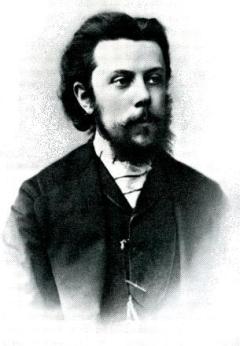
Modest Mussorgsky, 1865
Modest Mussorgsky (1839-1881) tried many times to write the music that we know today as Night on Bald Mountain, and he never got it into satisfactory form.
A sheet of paper apparently found among Mussorgsky's manuscripts contains the following statement: "Program of the opera St. John's Night, in three acts, after the tale by Gogol, written by P. Boborykin, in the presence and with the help of Modest Mussorgsky, Yevgeny Mussorgsky, and Vasily. Witness to the proceedings: Mily Balakirev."
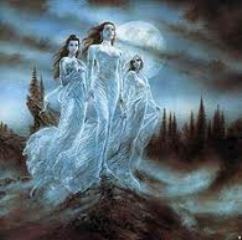
Sabbath (?)
This curious fragment, dated 25 December 1858, has been interpreted as an indication of Mussorgsky's intention of writing an opera on the subject of Gogol's short story St. John's Eve (Russian: Вечер накануне Ивана Купала, Vecher nakanune Ivana Kupala). Gogol's tale contains the elements of witchcraft common to other stories in the Evenings on a Farm near Dikanka collection, but does not, as is often claimed, feature a witches' sabbath. Although Mussorgsky may have composed thematic sketches for this project, his plans were not mentioned.
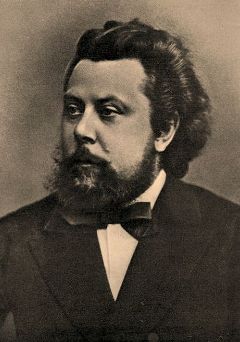
Modest Mussorgsky, 1870
The theme of a witches' sabbath, the central theme in all subsequent Night on Bald Mountain projects, appears to have been derived from the nonextant play The Witch (Russian: Ведьма, Ved'ma) by Baron Georgy Mengden, a military friend of the composer. In 1860 Mussorgsky informed Balakirev that he had been commissioned to write one act of an opera on this subject. But these plans for a stage-work came to nothing.

Night On Bald Mountain
Rimsky-Korsakov tells us that Mussorgsky's original versions of the work that he was to arrange as Night on Bald Mountain were impractical. This is only his opinion; one of these quite viable originals has in fact recently been revived and recorded. If he was not one of the great masters of instrumentation, Mussorgsky seems at least to have known the sound he wanted. But it is Rimsky's admittedly excellent orchestration of Bald Mountain that continues to live on in the concert hall.
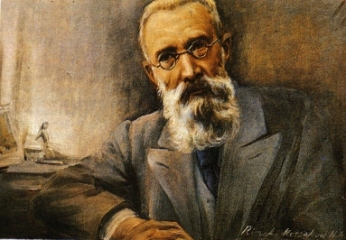
Rimsky-Korsakov
First composed in 1867 by Mussorgsky, the work whose Russian title translates St. John's Eve on the Bare Mountain underwent two subsequent adaptations by the composer - first as part of the opera-ballet Mlada, and finally as a sort of ill-fitting "dream-sequence" in his Gogol-based opera Sorochintsy Fair. After Mussorgsky's death in 1881, Rimsky-Korsakov took portions of all three versions of the St. John's music to create his orchestral tour de force.
"At first I could make nothing of Night on Bald Mountain," Rimsky wrote in his autobiography. "Mussorgsky had planned the piece originally in the 1860s (it was then called Midsummer's Eve), under the influence of Liszt's Totentanz, and then left it lying for a long time." After describing the other versions, Rimsky-Korsakov concludes that "none of these as a whole was suitable for publication and performance. Consequently I resolved to make a purely orchestral piece from Mussorgsky's material and did my utmost to keep all the best and most connected parts without change, and to put in as little as possible of my own."
Rimsky-Korsakov's reconstruction was published in 1886.
Inspired partly by a Gogol tale, Mussorgsky's Bald Mountain depicts a Witches' Sabbath on a Ukrainian mountain-top. Rimsky described his version thus: "Subterranean sounds of unearthly voices. Appearance of the Spirits of Darkness, followed by that of the Chernobog [Black God']. Glorification of Chernobog and celebration of the Black Mass. Witches' Sabbath. At the height of the orgy, the bell of the little village church is heard from afar. The Spirits of Darkness are dispersed. Daybreak."
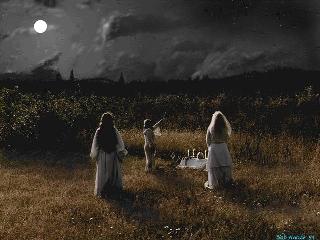
St. John's Night
In this age of authenticity, we are automatically suspicious of Rimsky’s complaint that Mussorgsky’s versions “remained unpolished,” and so we should remember that his motives were generous–he had been Mussorgsky’s friend, he liked this music, and he wanted it to find an audience. But Rimsky, for all his virtues, was not Mussorgsky, and his version is not so much a re-orchestration as it is a re-composition (one unsympathetic critic has called it a “bowdlerization”). He based his edition largely on Mussorgsky’s choral version in Sorochintsky Fair, eliminating large sections of the original in the process, and he brought his own considerable skills as an orchestrator to this score, clarifying textures and–even in this dark music–giving it a lighter, brighter sound. His version, quite polished but far from “the Russian soil” of the original, has nevertheless become one of the most popular works in the literature.
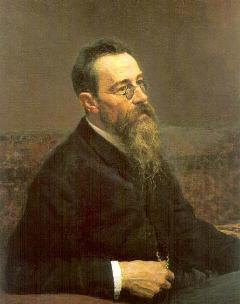
Rimsky-Korsakov
Russian legend tells of a witches' sabbath taking place on St. John's Night (June 23–24) on the Lysa Hora (Bald Mountain), near Kiev.
Original Tone Poem (1867) program by Mussorgsky is taken from the score: 1. Сбор ведьм, их толки и сплетни (Assembly of the witches, their chatter and gossip) 2. Поезд Сатаны (Cortège of Satan) 3. Чёрная служба, Messe noire (Black service, Black mass) 4. Шабаш (Sabbath)
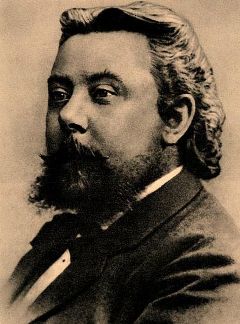
Modest Mussorgsky, 1876
More details and a variation to this program may be found in a letter written by the composer to Vladimir Nikolsky:
"So far as my memory doesn't deceive me, the witches used to gather on this mountain, gossip, play tricks and await their chief — Satan. On his arrival they, i.e. the witches, formed a circle round the throne on which he sat, in the form of a kid, and sang his praise. When Satan was worked up into a sufficient passion by the witches' praises, he gave the command for the sabbath, in which he chose for himself the witches who caught his fancy. –So this is what I've done. ... The form and character of the composition are both Russian and original".
Millions of twentieth-century listeners owe their initial acquaintance with Mussorgsky's tone-poem to the use within Walt Disney's 1940 film Fantasia of a specially produced version made by Leopold Stokowski.
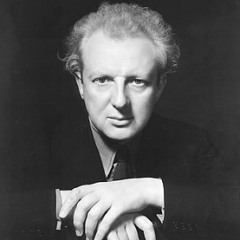
Leopold Stokowski
Stokowski stated that he based it on the Rimsky-Korsakov arrangement in form and content (though notably without the 'fanfare' that marks the entrance of the black god Chernobog) but Mussorgsky's original in orchestration. However, like Rimsky-Korsakov himself, Stokowski had no copy of the original tone poem from 1867, so he did what he felt Mussorgsky would have done. Stokowski was familiar to some extent with Mussorgsky's style, having conducted the U.S. premiere of the original version of Boris Godunov in 1929 and subsequently produced a symphonic synthesis of Boris for concert purposes. Stokowski went on to produce an even more drastic adaptation of Night for concert performance. The Stokowski arrangements are only rarely heard today, Rimsky-Korsakov's orchestration being the concert favorite, and the one most often programmed.
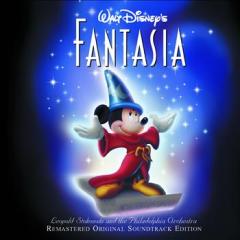
Walt Disney - Fantasia
Just a few years before Mussorgsky wrote this music, Melville finished the manuscript to Moby Dick and wrote to Hawthorne: “I have written a wicked book, and I feel spotless as a lamb.” Mussorgsky would have understood perfectly–in its original form, his “wicked prank” comes searing out of the black night with a savage, exuberant strength.
Note on the title: The Russian word "лысая" (lïsaya) literally means "bald", but is used in this case figuratively for a mountain supposedly barren of trees. In English, the titles A Night on the Bare Mountain or Night on Bald Mountain are used.
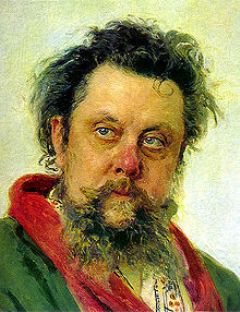
Modest Mussorgsky by Repin
Last Updated (Tuesday, 17 March 2015 14:54)








